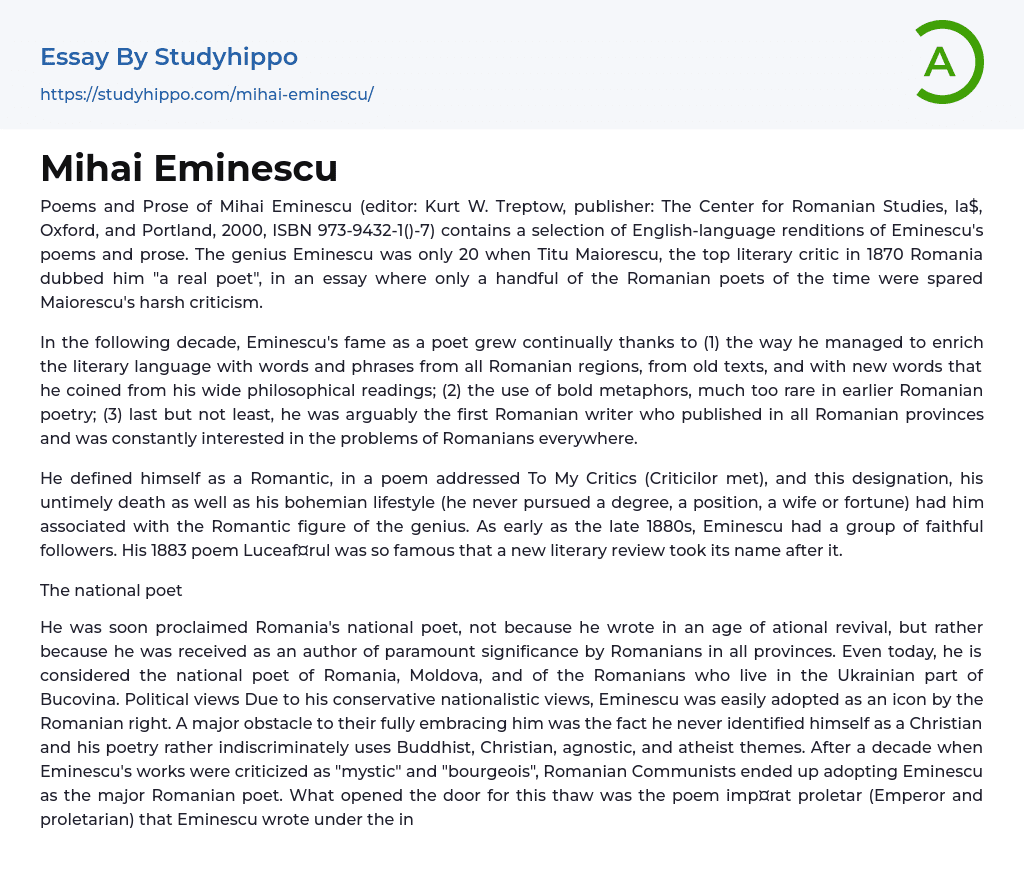Poems and Prose of Mihai Eminescu (editor: Kurt W. Treptow, publisher: The Center for Romanian Studies, la$, Oxford, and Portland, 2000, ISBN 973-9432-1()-7) contains a selection of English-language renditions of Eminescu's poems and prose. The genius Eminescu was only 20 when Titu Maiorescu, the top literary critic in 1870 Romania dubbed him "a real poet", in an essay where only a handful of the Romanian poets of the time were spared Maiorescu's harsh criticism.
In the following decade, Eminescu's fame as a poet grew continually thanks to (1) the way he managed to enrich the literary language with words and phrases from all Romanian regions, from old texts, and with new words that he coined from his wide philosophical readings; (2) the use of bold metaphors, much too rare in earlier Romanian poetry; (3) last but not least,
...he was arguably the first Romanian writer who published in all Romanian provinces and was constantly interested in the problems of Romanians everywhere.
He defined himself as a Romantic, in a poem addressed To My Critics (Criticilor met), and this designation, his untimely death as well as his bohemian lifestyle (he never pursued a degree, a position, a wife or fortune) had him associated with the Romantic figure of the genius. As early as the late 1880s, Eminescu had a group of faithful followers. His 1883 poem Luceaf¤rul was so famous that a new literary review took its name after it.
The national poet
He was soon proclaimed Romania's national poet, not because he wrote in an age of ational revival, but rather because he was received as an author of paramount significance by Romanians in
all provinces. Even today, he is considered the national poet of Romania, Moldova, and of the Romanians who live in the Ukrainian part of Bucovina. Political views Due to his conservative nationalistic views, Eminescu was easily adopted as an icon by the Romanian right. A major obstacle to their fully embracing him was the fact he never identified himself as a Christian and his poetry rather indiscriminately uses Buddhist, Christian, agnostic, and atheist themes. After a decade when Eminescu's works were criticized as "mystic" and "bourgeois", Romanian Communists ended up adopting Eminescu as the major Romanian poet. What opened the door for this thaw was the poem imp¤rat proletar (Emperor and proletarian) that Eminescu wrote under the influence of the 1870-1871 events in France, and which ended in a Schopenhauerian critique of human life. An expurgated version only showed the stanzas that could present Eminescu as a poet interested in the fate of proletarians.
- Boo Radley essays
- Genesis essays
- Richard iii essays
- Alice in Wonderland essays
- On the road essays
- Ozymandias essays
- The Nightingale essays
- Holden Caulfield essays
- Animal Farm essays
- 1984 essays
- A Hanging essays
- Shooting An Elephant essays
- A Tale Of Two Cities essays
- Adventures Of Huckleberry Finn essays
- Arthur Conan Doyle essays
- Brave New World essays
- Characters In Hamlet essays
- Characters In Romeo And Juliet essays
- Desdemona essays
- Diary Of A Wimpy Kid essays
- First-Person Narrative essays
- Frankenstein essays
- Heart Of Darkness essays
- Jane Eyre essays
- Jay Gatsby essays
- King Duncan essays
- Librarian essays
- Little Red Riding Hood essays
- Lord Of The Flies essays
- Silas Marner essays
- The Cask Of Amontillado essays
- The Catcher In The Rye essays
- The Crucible essays
- The Handmaid's Tale essays
- The Reader essays
- Virgil essays
- Wuthering Heights essays
- Candide essays
- Castle essays
- J. D. Salinger essays
- Ulysses essays
- Ethan Frome essays
- In Cold Blood essays
- Outliers essays
- Tuesdays With Morrie essays
- The Art of War essays
- Wife of Bath essays
- Huckleberry Finn essays
- The Lady With The Dog essays
- Great Expectations essays




